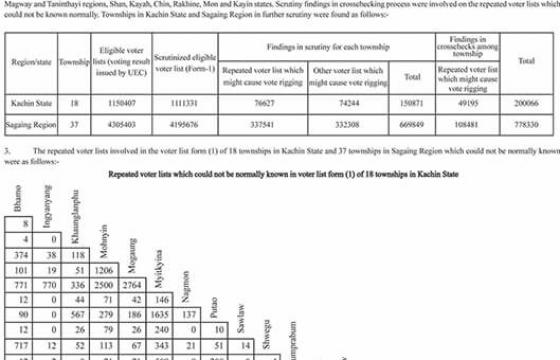When the Shan’s Committee for Shan State Unity (CSSU) has to withhold its meeting that was planned to take place from 20 to 22 July by the Burmese military attaché Brigadier General Khin Zaw, through the Thai military, it was said to be because of the planned meeting would involve the illegal organizations and also it would be infringing the country’s election law that could disrupt the peace process, many were at a loss what he really meant to say by such kind of accusations.
While by mentioning illegal organizations he might have Shan State Progress Party/Shan State Army (SSPP/SSA) in mind as it hasn’t signed the Nationwide Ceasefire Agreement (NCA) yet but in the process of negotiation with the government’s Peace Commission (PC), under the banner of United Nationalities Federal Council (UNFC), and also has state-level and union-level ceasefire agreements in place since 2012. Besides, the SSPP even have several liaison offices to coordinate in military matters with the Burma Army, also known as the Military or Tatmadaw, in government’s control towns in Shan State.
Thus, the argument that SSPP is an illegal organization holds no water and is not convincing. “I have my doubts [about the Tatmadaw’s sincerity] when they accuse us of endangering the peace process,” General Yawd Serk who heads the CSSU said on July 21 at a press conference in the northern Thai capital. “If this is the case, they should contact our office,” according to the recent report in Shan Herald Agency for News (SHAN).
“The military attaché says that the meeting was to include a non-NCA signatory group. This group is the SSPP. However, it should be noted that the SSPP regularly attends meetings within the UNFC [United Nationalities Federal Council, a coalition of ethnic armed groups who declined to sign the NCA with the government in October 2015].
“So how can this be hindering the peace process if the UNFC regularly meets with the Tatmadaw and the government?”
Regarding the statement of Khin Zaw that the CSSU meeting would be against the election law no one really has a clue by what he means. But if he meant it is against the NCA then he is totally wrong, as the meeting is held in accordance with the NCA guidelines. CSSU was scheduled to discuss about the five topics of Political Affairs, Security Matters, Economic Affairs, Social Issues, and Land and Natural Resources Management, to achieve a common goal and later table it in a wider representative audience within Shan State. And as all know, earlier the Tatmadaw has rejected the venue of Taunggyi or Panglong proposed by the CSSU by saying that the planned gathering should be held in a remote region of Shan State, where the Restoration Council of Shan State/Shan State Army (RCSS/SSA) – a signatory of the NCA – is in control but not suitable, as there are no facilities to hold such a massive gathering estimated to be more than 600 participants.
Following the cancellation of the meeting the CSSU in Chiang Mai a seven-point statement in Burmese was issued, which pointed out that although the Burmese military attaché argument holds no water that the CSSU meeting would disrupt the peace process, for the benefit of the two countries relationship it has opted not to hold the meeting. Furthermore, the statement said that it would inform and coordinate with the government’s National Reconciliation and Peace Center (NRPC) and PC in the peace process. It also urges the government bases its actions with broad-mindedness and careful consideration and that if there are any doubts, clarification should be requested.
Background on Military-Shan interaction
Now let us look at on how it has come to this by going back a little into the past to determine why the Tatmadaw’s mindset has been so obsessed with anti-Shan, anti-federalism tendencies, in addition to be so scared that the Shan would achieve unity.
The 1962 military coup that has its roots in the Shan spearheaded Federal Proposal to amend the 1947 Union of Burma Constitution was and still is seen by the Bamar military class as clipping the wings of the Bamar political supremacy and monopoly, while the non-Bamar ethnic nationalities are convinced that it is designed to make Burma Proper a Bamar State so that a level playing field of political arrangement, within the mold of ethnic-territorial-based federal union could be achieved.
It should be noted that the Panglong Agreement of 1947, the Union of Burma Constitution 1947, and Federal Amendment Proposal of the ethnic nationalities agreed in 1961 are the basis of achieving a justified and equal federal union from the view point of the ethnic nationalities.
The Bamar military following the anti-federalism advocacy of the then Bamar political elite headed by Ba Swe and Kyaw Nyein tried to whitewash all the historical treaties and legacies to rewrite the history to its advantage, which in turn led to the full blown ethnic resistance countrywide.
In February 2005, Shan Nationalities League for Democracy (SNLD) chairman Hkun Htun Oo and seven other Shan leaders, including Sao Hsur Ten, leader of the SSPP/SSA, were arrested, convicted of high treason and sentenced to jail terms ranging from 79 to 106 years. On February 7 they were discussing to work out common positions among the Shan people on how to go about with the the then ongoing National Convention tasked with drawing a new constitution, under the military government, in Nyaung Nabin and were arrested with the accusation of endangering the existence of union.
In March 2016, the CSSU meeting in Rangoon was also disrupted by local authorities possibly on the orders of the Tatmadaw.
Repeated requests of the CSSU to allow Shan National dialogue to be conducted either in Taunggyi or Panglong towns, prior to the second 21st Century Panglong Conference held from May 24 to 29, was rejected by the Tatmadaw until today.
On 2017 July 19, CSSU planned meeting in Chiang Mai from July 20 to 22 has to be cancelled, due to the disruption of the Burmese military attaché to the Thai government.
Possible reasons and way out of distrustful atmosphere
While there could be many reasons to hinder the Shan National Dialogue by the Tatmadaw, speculations like the Military not really believing in federalism and giving only lip service; having Military and Bamar supremacy aim as its strategic goals; Seeing the Shan as a main culprit in ethnonationalism and separatism; and suppressing and getting the Shan checkmated would ensure Bamar political edge and also control the other restless non-Bamar ethnic nationalities are rife, if impossible to verify.
But the historical backdrop and the indications that followed in chain have proven the Tatmadaw’s anti-Shan and anti-federalism tendencies. Again, all these points to the lack of Military’s commitment and political will to really work for the political settlement through the formation of a federal union that is embedded in equality, rights of self-determination, universal human rights and democracy.
It is clear that distrust has to be eliminated and trust-building nurtured, if we are to move forward. But what exactly is the distrust between the Military and the Shan?
The Shan are distrustful that the Military won’t be sincere to resolve the conflict through political dialogue and its commitment on a genuine federalism, while the Military never is convinced that the Shan would not opt for a total independence that would break up the union.
When the issue of non-secession was discussed and the Shan rejected the inclusion of the clause in the Union (Pyidaungsu) Accord during the second 21CPC, the SNLD made it clear that it is for the solution of a voluntary participation of the union, as agreed in Panglong Agreement of 1947 and nothing has changed.
On the government non-secession demand the SNLD made a press conference on June 1, 2017, at its headquarter, where Party spokesman Sai Nyunt Lwin said: “We never demand secession from the union. We are already there to cooperate,” adding, “this is to clearly dispel accusation and rumors that we are not demanding secession.”
All this come about as SNLD rejected the non-secession clause demanded by the government to be included in the Union Accord.
Sai Nyunt Lwin made his point by arguing that no such words that could hold back participation of the EAOs that are still negotiating and about to negotiate be used during this period, as this would discourage them from joining the peace conference.
“If we want to secede from the union, we only need to do one thing. We would disregard the treaty (Panglong Agreement) signed in 1947. Until we haven’t done that, it is going to be normal as it used to be,” he stressed as a matter of fact.
Now the Military would need to show that it also meant business by halting the ongoing offensives in Kachin and Shan States, while making assurance that it is really for the genuine federal union by withdrawing its commitment to protect the military-drafted constitution, which is neither democratic nor federal in any sense of the words.
In sum, it is the turn of the Military to agree and support the State-level Shan National Dialogue and not disrupting it, if it is really following the NCA guidelines. This would be the start in dismantling distrust from the point of the Shan organizations. After this all the other measures to build trust on the ground by halting offensives and cooperation in peace talks for the all agreeable political system could be worked out.
Thus, until the distrust elimination measures are first taken by the Military, there is no hope for trust-building to take place, as the saying “you can’t make an omelette without breaking eggs” hasn’t been there for nothing.






